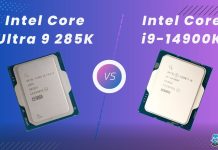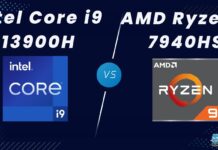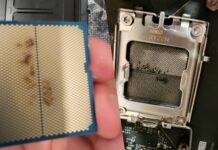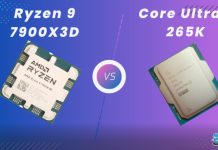AMD Ryzen 7 7800X3D Rated: 8/10 Intel Core Ultra 5 245K Rated: 7.5/10
Pros And Cons
| CPU | Pros | Cons |
|---|---|---|
| Core Ultra 5 245K | ✅ Has 6 more physical cores ✅ Unlocked multiplier | ❌ Slightly worse in terms of performance |
| Ryzen 7 7800X3D | ✅ Has 73 MB larger L3 cache size ✅ Better in terms of performance | ❌ Much more expensive |
Comparison Table
| Feature | Core Ultra 5 245K | Ryzen 7 7800X3D |
|---|---|---|
| Instruction Set | x86-64 | x86-64 |
| Codename | Arrow Lake | Zen 4 (Raphael) |
| Model number | 245K | - |
| Integrated GPU | Arc Xe2 (Arrow Lake-S) | Radeon Graphics (Ryzen 7000) |
| Transistors | 17.8 billions | 11.2 billions |
| Fabrication Process | 3 nm | 5 nm |
| Best Motherboards | - | BEST Motherboards For Ryzen 7 7800X3D |
| Best CPU Coolers | - | Best CPU Coolers For Ryzen 7 7800X3D |
| Processor Review | Intel Core Ultra 5 245K Review | AMD Ryzen 7 7800X3D Review |
Architectural Differences
- Core Count: The 7800X3D has 8 cores and 16 threads, while the 245K has 14 cores and 14 threads, made up of 6 performance cores and 8 efficiency cores.
- Clock Speed: The base frequency of the 7800X3D is about 4.4GHz, while the 245K has a base frequency of 4.2GHz. The former boosts to 5GHz, while the latter boosts to 5.2GHz.
- Process Node: Intel’s 245K uses a newer, more advanced 3nm manufacturing process, while the 7800X3D has a slightly older 5nm process size.
- TDP: The Ryzen has a TDP of 120 watts, whereas the 245K takes around 125 watts of power.
- Cache: The L3 cache of the 7800X3D is about 96 megabytes, whereas the 245K has an L3 cache size of 24 megabytes, much smaller than the Ryzen’s.
Intel has lacked innovation in the releases building up to these new Core Ultra chips. However, these new chips might be the change we require to get greatness out of this company again. This Core Ultra 5 245K vs Ryzen 7 7800X3D comparison will gauge the extent of these changes!
Gaming Benchmarks – 1080p
Having detailed the comparative specs of these chips, the following sections of the Core Ultra 5 245K vs Ryzen 7 7800X3D comparison will take a look at how they perform against each other in games. The specs of the test bench we used for these tests are written below:
Test Bench
- OS – Windows 11
- RAM 1 – G.Skill Trident Z5 RGB 32GB DDR5-6600
- CPU Cooler: Noctua NH-U12S SE-AM4
- Graphics Card – GIGABYTE RTX 4090 Gaming OC 24G
- SSD – CORSAIR MP700 PRO 2TB
- Power Supply – be quiet! Dark Power Pro 13 1300W
Star Wars Jedi: Survivor

- The first title of our comparisons showed a framerate of 142 FPS on the 245K, which was about 45% behind the 206 FPS we saw with the 7800X3D.
- The 7800X3D went down to a framerate of 185 FPS on the 1% lows, which was still 62% higher than the 114 FPS of the 245K in our test of Star Wars Jedi: Survivor.
The Last Of Us Part 1

- The difference in framerate was lower in The Last Of Us, but the 7800X3D was still 10% ahead with a framerate of about 197 FPS, while the 245K hovered closer to 179 FPS on average.
- There was barely any difference in the 1% lows, with the 7800X3D getting a minimum of about 136 FPS, whereas the 245K had a 1.5% lower performance at around 134 FPS.
Cyberpunk 2077

- The 7800X3D got an average framerate of 202 FPS in Cyberpunk, which was about 51% higher than the 134 FPS that the 245K got.
- The minimum framerates were around 143 FPS on the 7800X3D in our testing, which was about 41% higher than the 101 FPS that the 245K got.
Hogwarts Legacy

- The 7800X3D enjoyed a 22% boost in performance in Hogwarts Legacy, where it got a framerate of 141 FPS, whereas the 245K had a framerate closer to 115 FPS in our testing.
- We measured a difference of around 27% when it came to the 1% lows, with the 7800X3D having a framerate of 103 FPS, while the 245K hovered closer to 81 FPS.
Remnant 2

- Remnant 2 saw an average framerate of 138 FPS with the 7800X3D, whereas the 245K was about 25% slower with an average framerate of only around 110 FPS.
- The minimum framerates were around 24% higher on the 7800X3D, which had a framerate of 120 FPS, while the 245K offered 1% lows of around 97 FPS.
Homeworld 3

- Our test of Homeworld 3 ran much better on the 7800X3D, with an average framerate of 117 FPS, which was about 45% higher than the 81 FPS of the 245K.
- There was a huge difference in the 1% lows, with the 7800X3D having a minimum of 52 FPS, while the 245K was about half as stable with a minimum of 27 FPS.
A Plague Tale: Requiem

- Testing these chips with A Plague Tale: Requiem, we saw the 7800X3D had an average framerate of 178 FPS, which was about 48% higher than the 120 FPS of the 245K.
- The minimum framerates were around 73 FPS with the 245K, which was around 74% lower than the 127 FPS we saw with the Ryzen 7 7800X3D.
Hitman 3

- The last game of our testing had an average framerate of 268 FPS on the 7800X3D, whereas the Core Ultra 5 245K hovered around 232 FPS in Hitman 3, marking the 245K as about 15% faster.
- The minimum framerates were around 238 FPS on the Ryzen, which was once again 15% higher than the 206 FPS that the 245K managed.
Productivity Benchmarks
Now that we’ve taken a look at the gaming benchmarks of these processors, we will see how they compare against each other in terms of productivity benchmarks. These tests were done with the same test bench as we used in the gaming tests.
Cinebench R24

- In the single-bench Cinebench tests, the 245K pulled ahead with a score of 137 points, whereas the 7800X3D got a score closer to around 120 points. This difference computes to around 14%.
- The multi-core score was also higher on the 245K, with a score of 1522 points. It led the 7800X3D by around 36%, with the Ryzen getting around 1115 points.
7-Zip

- In the compression part of this test, the 7800X3D pulled behind with a score of 124 points, while the 245K was around 8% faster with a score of 134 points.
- The decompression tests ran around 11% faster on the Ryzen, where we saw a score of 134 points, while the Core Ultra had a score of about 121 points.
Photoshop

- The Pudget systems benchmark ran a bit better on the Ryzen 7 7800X3D, which was about 5% faster than the Core Ultra 5 245K in our testing.
- The Intel chip got a score of 10465 points, whereas the AMD chip got around 10984 points.
Overall Performance
Average Framerate
The difference we saw between these chips was remarkable when it came to the average framerates. The Ryzen 7 7800X3D was about 30% faster than the 245K on average in our tests, with the difference shooting up close to 50% in some games. The 7800X3D consistently beat the Core Ultra in all the games we tested.
1% Lows
The minimum framerates were no better. The 7800X3D ran these games about 32% better than the 245K when it came to the 1% lows, which made a night and day difference in some of the games like Homeworld 3. The 7800X3D was consistently remarkably faster than the Core Ultra.
Productivity
The overall win in productivity goes to the Core Ultra 5 245K in our testing. The 7800X3D was a bit faster in the 7-Zip decompression test as well as the Photoshop test, but it did not add up too much. However, GPU-bound tasks might run better on the 7800X3D because of the extra headroom it clears.
Power Consumption
| Game | Ryzen 7 7800X3D | Core Ultra 5 245K |
|---|---|---|
| Star Wars Jedi: Survivor | 58 | 73 |
| The Last Of Us Part 1 | 59 | 71 |
| Cyberpunk 2077 | 54 | 74 |
| Hogwarts Legacy | 57 | 73 |
| Remnant 2 | 57 | 70 |
| Homeworld 3 | 55 | 69 |
| A Plague Tale: Requiem | 53 | 73 |
| Hitman 3 | 58 | 71 |
| Average Power Draw | 56.375⚡ | 71.75⚡ |
| Winner: Ryzen 7 7800X3D | ||
When we tested the power consumption of these chips, we saw that the Ryzen 7 7800X3D took about 22% less power than the Core Ultra 5 245K, which is remarkable as the Intel chip already barely sips power. AMD has continued to impress with the power consumption of the X3D chips with this processor.
Temperatures
| Game | Ryzen 7 7800X3D | Core Ultra 5 245K |
|---|---|---|
| Star Wars Jedi: Survivor | 68 | 68 |
| The Last Of Us Part 1 | 66 | 64 |
| Cyberpunk 2077 | 67 | 76 |
| Hogwarts Legacy | 69 | 78 |
| Remnant 2 | 67 | 67 |
| Homeworld 3 | 68 | 65 |
| A Plague Tale: Requiem | 65 | 68 |
| Hitman 3 | 67 | 64 |
| Average Temperatures | 67.125🌡️ | 68.75🌡️ |
| Winner: Ryzen 7 7800X3D | ||
The temperatures were barely different between these two chips, with the 7800X3D being about 3% cooler than the Core Ultra 5 245K. Overall, temperatures were very manageable on both processors and should not be seen as a pivotable deciding factor between these chips.
Price And Value
| CPU | Ryzen 7 7800X3D | Core Ultra 5 245K | Price Difference |
|---|---|---|---|
| Launch MSRP | 💲499 | 💲319 | 56.43% |
| Current Price | 💲399 | 💲279 | 43.01% |
The Core Ultra 5 245K was released at a lower price than the 7800X3D, and the recent changes in the price of both these chips have kept a sizeable difference between them. As of late December 2024, the Ryzen 7 7800X3D costs around 43% more than the 245K.
Our Recommendation
Core Ultra 5 245K: To be honest, we weren’t sold on this chip while making this comparison, but the price painted it in a new light. This chip did drag behind in the gaming tests, but there might be a difference you might notice at 1440p and 4k gaming if you choose to use this chip with a better GPU.
Ryzen 7 7800X3D: Though the price of this chip has not dropped significantly since its release, it still is one of the most powerful gaming processors on the planet while still being extremely efficient in terms of power consumption. The performance-per-watt of this chip is truly marvellous.
After all this discussion, we would recommend the Core Ultra 5 245K to people who want to build a low-budget build to play games at higher resolutions, while the 7800X3D takes the win in overall performance if you have the budget for it.
More From Ryzen 7 7800X3D
Thank you! Please share your positive feedback. 🔋
How could we improve this post? Please Help us. 😔
[Comparisons Expert]
Shehryar Khan, a seasoned PC hardware expert, brings over three years of extensive experience and a deep passion for the world of technology. With a love for building PCs and a genuine enthusiasm for exploring the latest advancements in components, his expertise shines through his work and dedication towards this field. Currently, Shehryar is rocking a custom loop setup for his built.
Get In Touch: shehryar@tech4gamers.com







